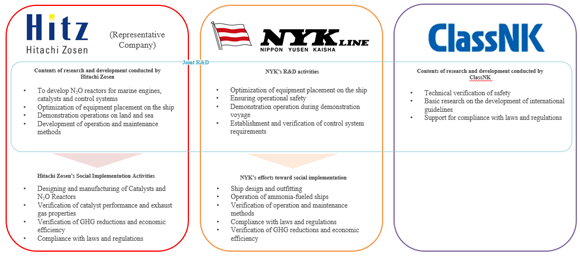Press Release
Title:
Development of N2O Removal Equipment for Ammonia-Fueled Carrier, Selected for The Green Innovation Fund project “Next Generation Ship Development”
~ Initiatives to Reduce Greenhouse Gas Emissions from International Marine Transportation ~
Hitachi Zosen Corporation. (Osaka City, Osaka, Sadao Mino, President & CEO, hereinafter “Hitachi Zosen”) and Nippon Yusen Kabushiki Kaisha (Chiyoda-ku, Tokyo, Representative: Takaya Soga, President, hereinafter “NYK”) are pleased to announce that the jointly proposed "Development of N2O Reactors for Ammonia-Fueled Carrier" has been selected by the New Energy and Industrial Technology Development Organization (NEDO) as a "Next Generation Ship Development" which was additionally invited in November 2023 as a part of Green Innovation Fund Project (hereinafter “GI Fund Project”).
In July 2023, the International Maritime Organization (IMO) set a target of achieving virtually no greenhouse gases (GHG) emitted from international marine transportation by around 2050. In order to achieve this target, R&D of next-generation ships that do not emit GHG is an urgent task, and in particular, the development of technology to convert ship fuel from conventional fossil fuels to alternative fuels such as ammonia, which emits no carbon dioxide (hereinafter referred to as CO2) when burned, is being promoted as a GI Fund project.
The project aims to develop a catalytic removal system for nitrous oxide ('N2O') emitted when ammonia is used as fuel ('N2O Reactor'). N2O's global warming potential※1 is about 300 times that of CO2, and it is essential to reduce N2O emissions in order to realize ammonia-fueled vessel carriers that are highly effective in reducing GHG emissions. By developing and disseminating
N2O reactors, we are aiming for the early realization of Carbon Neutral in maritime transport.
Hitachi Zosen has a strong track record and know-how in catalytic technology, including the development of marine vessel SCR (Selective Catalytic Reduction) system for removing nitrogen oxides (NOx) in marine engines. In this business, we will develop catalysts and equipment to reduce N2O for marine 2-stroke engines※2 and optimize equipment layout.
NYK will install N2O reactor developed by Hitachi Zosen on the ammonia-fueled carrier scheduled to be completed in November 2026, and will be in charge of safety and performance verification by demonstration navigation.
ClassNK, as a partner organization, will conduct safety verification of N2O reactors and basic research on the development of international guidelines.
[The roles of each company in this business and initiatives for social implementation]

Three parties will lead the world in environmental technology by actively challenging the research and development of next-generation ships that do not emit GHGs and contribute to the reduction of GHGs emitted by international marine transportation.
The outline of the project is as follows:
1.Publicly solicited by : New Energy and Industrial Technology Development Organization (NEDO)
2.Project name : Green Innovation Fund Project "Development of Next Generation Ships" Project (additional public offering)
3.Implementor : Hitachi Zosen Corporation, Nippon Yusen Kabushiki Kaisha.
4.Partner Organization : ClassNK
5.R&D theme : Development of N2O Reactors for Ammonia-Fueled Carrier
6.Implementation period : FY2024 to FY2027
※1 Global warming potential
A number that represents how well other GHG are capable of warming the globe relative to CO2.
※2 2-stroke engine
An engine that performs one combustion per revolution of the engine (one piston reciprocating), and is characterized by its a small number of parts, a light weight, and compact size.
Close